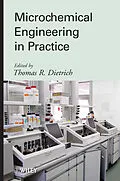Microchemical Engineering in Practice provides the information chemists and engineers need to evaluate the use of microreactors, covering the technical, operational, and economic considerations for various applications. It explains the systems needed to use microreactors in production and presents examples of microreactor use in different chemistries, including larger scale production processes. There are guidelines on calculating the costs and the risks of production using continuous flow microreactors. Complete with case studies, this is an essential guide for chemists and engineers interested in investigating the advantages of chemical microreactors.
Autorentext
THOMAS R. DIETRICH, PhD, is founder and Chief Executive Officer of mikroglas chemtech GmbH, a company producing chemical microreactors and microreaction equipment. In addition to being an author in several journals and a lecturer at conferences, Dr. Dietrich is a leading member of several international organizations, including the DECHEMA industry consortium MicroChemTec (Germany), the Process Development Division group on microchemical engineering within AIChE (USA), and the advisory board of the Centro de Microprocesos at the Tecnológico de Monterrey (Mexico).
Klappentext
Discover how to fully leverage microreaction technology
Microchemical Engineering in Practice enables chemists and engineers to determine which chemical microreactors are suitable for a given application by fully detailing all the technical, operational, and economic criteria that need to be accounted for when making an informed decision. The book provides everything readers need to know to reap the benefits of microreaction technology, including:
- Systems needed to place microreactors into production
-
Examples and case studies demonstrating how different microreactors are used for different applications
-
Strategies for large-scale development and large-scale production
-
Guidelines for calculating the costs and investment needed for development and production
Following an introduction that explores the impact of microtechnologies in chemical processing, the book covers microfluidic modules, peripheric equipment, and microreaction plants. The final section is dedicated to specific applications, including:
- Polymerization in microfluidic reactors
-
Photo reactions
-
Intensification of the catalytic process by microstructured reactors
-
Separation units
-
Multiphase reactions
Microchemical Engineering in Practice features a team of expert authors whose experience ranges from designing chemical microreactors to putting them into production in large-scale operations. As a result, this is an essential guide for chemists and engineers interested in investigating and harnessing the full potential of chemical microreactors.
Zusammenfassung
Microchemical Engineering in Practice provides the information chemists and engineers need to evaluate the use of microreactors, covering the technical, operational, and economic considerations for various applications. It explains the systems needed to use microreactors in production and presents examples of microreactor use in different chemistries, including larger scale production processes. There are guidelines on calculating the costs and the risks of production using continuous flow microreactors. Complete with case studies, this is an essential guide for chemists and engineers interested in investigating the advantages of chemical microreactors.
Inhalt
Chapter 1: Introduction (Thomas Dietrich).
1.1 The Impact of Micro-Technologies in Chemical Processing
(Jean F. Jenck).
Chapter 2: Microfluidic Modules.
2.1 Materials and Production Technology.
2.1.1 Micro-reactors built of metallic materials (Frank N.
Herbstritt).
2.1.2 Microreactors built of insulating materials (Norbert
Schwesinger and Andreas Freitag).
2.2 Unit Operations.
2.2.1: Micromixers (Joölle Aubin and Catherine Xuereb).
2.2.2. Micro-Channel Heat Exchangers and Reactors (Mark George
Kirby and Svend Rumbold).
2.2.3. Separation Units (Asterios Gavriilidis and John Edward
Andrew Shaw).
2.3 Calculations and Simulations (Dieter Bothe).
Chapter 3: Peripheric Equipment.
3.1. Dosage Equipment (Asif Karim and Wolfgang Loth).
3.2 Micromachined sensors for microreactors (Jan Dziuban).
3.3 Automating Micro Process Systems (Thomas
Mller-Heinzerling).
Chapter 4: Microreaction Plants.
4.1 Strategies for lab scale development (Dirk Kischneck).
4.2. Microreaction Systems for Education (Marcel A. Liauw and
Dina E. Treu).
4.3 Microreaction Systems for Large-Scale Production (Anna Lee
Y. Tonkovich and Eric A. Daymo).
4.4 Process intensification (Michael Matlosz and Ing. Hab.
Laurent Falk).
4.5 Standardisation in Micro Process Engineering (Alexis
Bazzanella).
Chapter 5: Applications.
5.1 Polymerization in Microfluidic Reactors (Eugenia Kumacheva,
Hong Zhang, and Zhihong Nie).
5.2. Photo Reactions (Teijiro Ichimura, Yoshihisa Matsushita,
Kosaku Sakeda, Tadashi Suzuki).
5.3 Intensification of catalytic process by micro-structured
reactors: opportunities and limits (Kiwi Minsker and Albert
Renken).
5.4 Separation Units (Bernd Nidetzky and Malene S. Thomsen).
5.5 Multiphase Reactions (J.G.E. (Han) Gardeniers).
